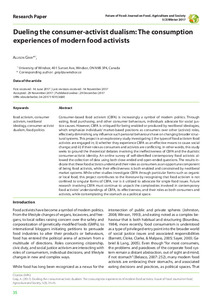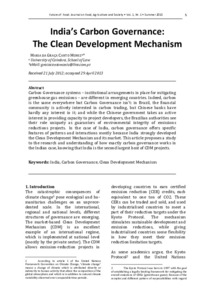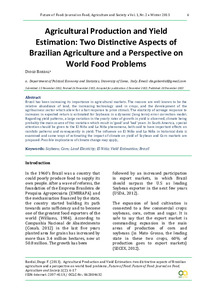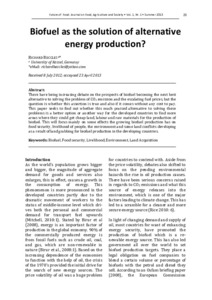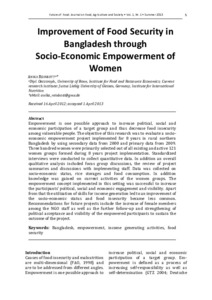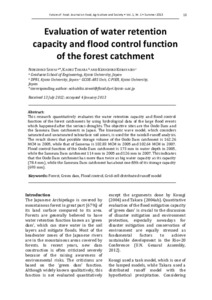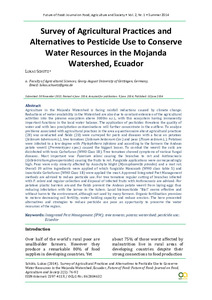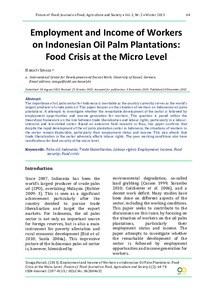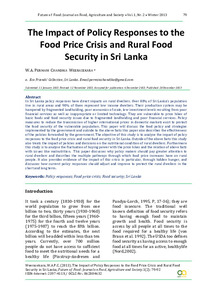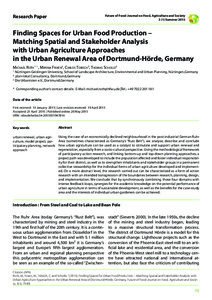Suche
Anzeige der Dokumente 71-80 von 84
Aufsatz
 Dueling the consumer-activist dualism: The consumption experiences of modern food activists
Dueling the consumer-activist dualism: The consumption experiences of modern food activists
(Department of Organic Food Quality and Food Culture at the University of Kassel, Germany and Federation of German Scientists (VDW), 2017-12-29)
Consumer-based food activism (CBFA) is increasingly a symbol of modern politics. Through eating, food purchasing, and other consumer behaviours, individuals advocate for social justice causes. However, CBFA is critiqued for being enabled or produced by neoliberal ideologies, which emphasize individuals’ market-based positions as consumers over other (activist) roles, effectively diminishing any influence such personal behaviours have on changing broader structural systems. This project is an exploratory study ...
Aufsatz
 India’s Carbon Governance: The Clean Development Mechanism
India’s Carbon Governance: The Clean Development Mechanism
(Department of Organic Food Quality and Food Culture at the University of Kassel, Germany and Federation of German Scientists (VDW), 2013-04-29)
Carbon Governance systems – institutional arrangements in place for mitigating greenhouse gas emissions – are different in emerging countries. Indeed, carbon is the same everywhere but Carbon Governance isn’t: in Brazil, the financial community is actively interested in carbon trading, but Chinese banks have hardly any interest in it; and while the Chinese government takes an active interest in providing capacity to project developers, the Brazilian authorities see their role uniquely as guarantors of environmental ...
Aufsatz
 Agricultural Production and Yield Estimation: Two distinctive aspects of Brazilian Agriculture and a perspective on world food problems
Agricultural Production and Yield Estimation: Two distinctive aspects of Brazilian Agriculture and a perspective on world food problems
(Department of Organic Food Quality and Food Culture at the University of Kassel, Germany and Federation of German Scientists (VDW), 2013-12-20)
Brazil has been increasing its importance in agricultural markets. The reasons are well known to be the relative abundance of land, the increasing technology used in crops, and the development of the agribusiness sector which allow for a fast response to price stimuli. The elasticity of acreage response to increases in expected return is estimated for Soybeans in a dynamic (long term) error correction model. Regarding yield patterns, a large variation in the yearly rates of growth in yield is observed, climate being ...
Aufsatz
 Biofuel as the solution of alternative energy production?
Biofuel as the solution of alternative energy production?
(Department of Organic Food Quality and Food Culture at the University of Kassel, Germany and Federation of German Scientists (VDW), 2013-04-23)
There have being increasing debate on the prospects of biofuel becoming the next best alternative to solving the problem of CO2 emission and the escalating fuel prices, but the question is whether this assertion is true and also if it comes without any cost to pay. This paper seeks to find out whether this much praised alternative to solving these problems is a better option or another way for the developed countries to find more areas where they could get cheap land, labour and raw materials for the production of ...
Aufsatz
 Improvement of Food Security in Bangladesh through Socio-Economic Empowerment of Women
Improvement of Food Security in Bangladesh through Socio-Economic Empowerment of Women
(Department of Organic Food Quality and Food Culture at the University of Kassel, Germany and Federation of German Scientists (VDW), 2013-04-01)
Empowerment is one possible approach to increase political, social and economic participation of a target group and thus decrease food insecurity among vulnerable people. The objective of this research was to evaluate a socio-economic empowerment project implemented for 8 years in rural northern Bangladesh by using secondary data from 2000 and primary data from 2009. Three hundred women were primarily selected out of all existing and active 121 women groups formed during 8 years project implementation. Standardized ...
Aufsatz
 Evaluation of water retention capacity and flood control function of the forest catchment
Evaluation of water retention capacity and flood control function of the forest catchment
(Department of Organic Food Quality and Food Culture at the University of Kassel, Germany and Federation of German Scientists (VDW), 2013-01-04)
This research quantitatively evaluates the water retention capacity and flood control function of the forest catchments by using hydrological data of the large flood events which happened after the serious droughts. The objective sites are the Oodo Dam and the Sameura Dam catchments in Japan. The kinematic wave model, which considers saturated and unsaturated sub-surface soil zones, is used for the rainfall-runoff analysis. The result shows that possible storage volume of the Oodo Dam catchment is 162.26 MCM in 2005, ...
Aufsatz
 Survey of Agricultural Practices and Alternatives to Pesticide Use to Conserve Water Resources in the Mojanda Watershed, Ecuador
Survey of Agricultural Practices and Alternatives to Pesticide Use to Conserve Water Resources in the Mojanda Watershed, Ecuador
(Department of Organic Food Quality and Food Culture at the University of Kassel, Germany and Federation of German Scientists (VDW), 2014-06-10)
Agriculture in the Mojanda Watershed is facing rainfall reductions caused by climate change. Reductions of water availability in the Watershed are also due to constant extension of the agricultural activities into the páramo ecosystem above 3000m a.s.l., with this ecosystem having immanently important functions in the local water balance. The application of pesticides threatens the quality of water and with less precipitation contaminations will further concentrate in the outflow. To analyze problems associated with ...
Aufsatz
 Employment and Income of Workers on Indonesian Oil Palm Plantations: Food Crisis at the Micro Level
Employment and Income of Workers on Indonesian Oil Palm Plantations: Food Crisis at the Micro Level
(Department of Organic Food Quality and Food Culture at the University of Kassel, Germany and Federation of German Scientists (VDW), 2013-12-20)
The importance of oil palm sector for Indonesia is inevitable as the country currently serves as the world’s largest producer of crude palm oil. This paper focuses on the situation of workers on Indonesian oil palm plantations. It attempts to investigate whether the remarkable development of the sector is followed by employment opportunities and income generation for workers. This question is posed within the theoretical framework on the link between trade liberalisation and labour rights, particularly in a ...
Aufsatz
 Impact on Policy Responses to Food Price Crisis and Rural Food Security in Sri Lanka
Impact on Policy Responses to Food Price Crisis and Rural Food Security in Sri Lanka
(Department of Organic Food Quality and Food Culture at the University of Kassel, Germany and Federation of German Scientists (VDW), 2013-12-20)
In Sri Lanka policy responses have direct impacts on rural dwellers. Over 80% of Sri Lanka’s population live in rural areas and 90% of them represent low income dwellers. Their production system may be hampered by fragmented landholding, poor economics of scale, low investment levels resulting from poor financial services as well as inappropriate or limited technology. They are vulnerable to price hikes of basic foods and food security issues due to fragmented landholding and poor financial services. Policy measures ...
Aufsatz
 Finding Spaces for Urban Food Production – Matching Spatial and Stakeholder Analysis with Urban Agriculture Approaches in the Urban Renewal Area of Dortmund-Hörde, Germany
Finding Spaces for Urban Food Production – Matching Spatial and Stakeholder Analysis with Urban Agriculture Approaches in the Urban Renewal Area of Dortmund-Hörde, Germany
(Department of Organic Food Quality and Food Culture at the University of Kassel, Germany and Federation of German Scientists (VDW), 2015-05-20)
Using the case of an economically declined neighbourhood in the post-industrial German Ruhr Area (sometimes characterized as Germany’s “Rust Belt”), we analyse, describe and conclude how urban agriculture can be used as a catalyst to stimulate and support urban renewal and regeneration, especially from a socio-cultural perspective. Using the methodological framework of participatory action research, and linking bottom-up and top-down planning approaches, a project path was developed to include the population affected ...

